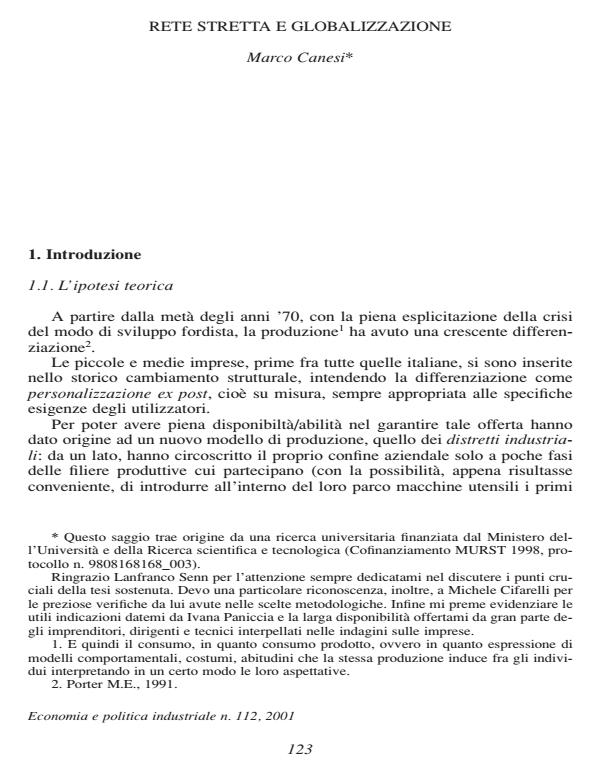Rete stretta e globalizzazione
Titolo Rivista ECONOMIA E POLITICA INDUSTRIALE
Autori/Curatori Marco Canesi
Anno di pubblicazione 2002 Fascicolo 2001/112
Lingua Italiano Numero pagine 38 P. Dimensione file 148 KB
DOI
Il DOI è il codice a barre della proprietà intellettuale: per saperne di più
clicca qui
Qui sotto puoi vedere in anteprima la prima pagina di questo articolo.
Se questo articolo ti interessa, lo puoi acquistare (e scaricare in formato pdf) seguendo le facili indicazioni per acquistare il download credit. Acquista Download Credits per scaricare questo Articolo in formato PDF

FrancoAngeli è membro della Publishers International Linking Association, Inc (PILA), associazione indipendente e non profit per facilitare (attraverso i servizi tecnologici implementati da CrossRef.org) l’accesso degli studiosi ai contenuti digitali nelle pubblicazioni professionali e scientifiche.
This study maintains that companies forming industrial districts face difficulties not so much because they lack the transnational organization adopted by larger ones but rather because they have hitherto failed to devise and carry out the organizational changes needed to overcome a crucial contradiction inherent in ex post personalization of their products, (personalization to suit the client instead of choices made from a wide but standardized available range). To preserve their market position intact these firms must of necessity be flexible but, even more important, creative which implies a small size and full independence as well as self containment and flexible intersectorial integration. To remain competitive, however, they must inevitably acquire new strategic functions which, being of a specific kind and implying economies of scale at a high level, become incompatible with one or other of their previous requisites: if internalised greater size will become unavoidable; if externalised, there must be loss of independence. It follows that regaining a leading position in world markets can only be achieved by adopting a particular kind of network organization in which both Williamsonian pure governing forms - the hierarchy (co-operation, spatial centralization) and the market (competition, spatial decentralization) - are integrally present, to avoid that compromise inherent in the mixed governing form. It is just to overcome the crucial contradiction ever present in ex post personalization that assumption is here made of a third pure governing form, alongside the other two, and to this third form the term close network has been given.
Marco Canesi, Rete stretta e globalizzazione in "ECONOMIA E POLITICA INDUSTRIALE " 112/2001, pp , DOI: